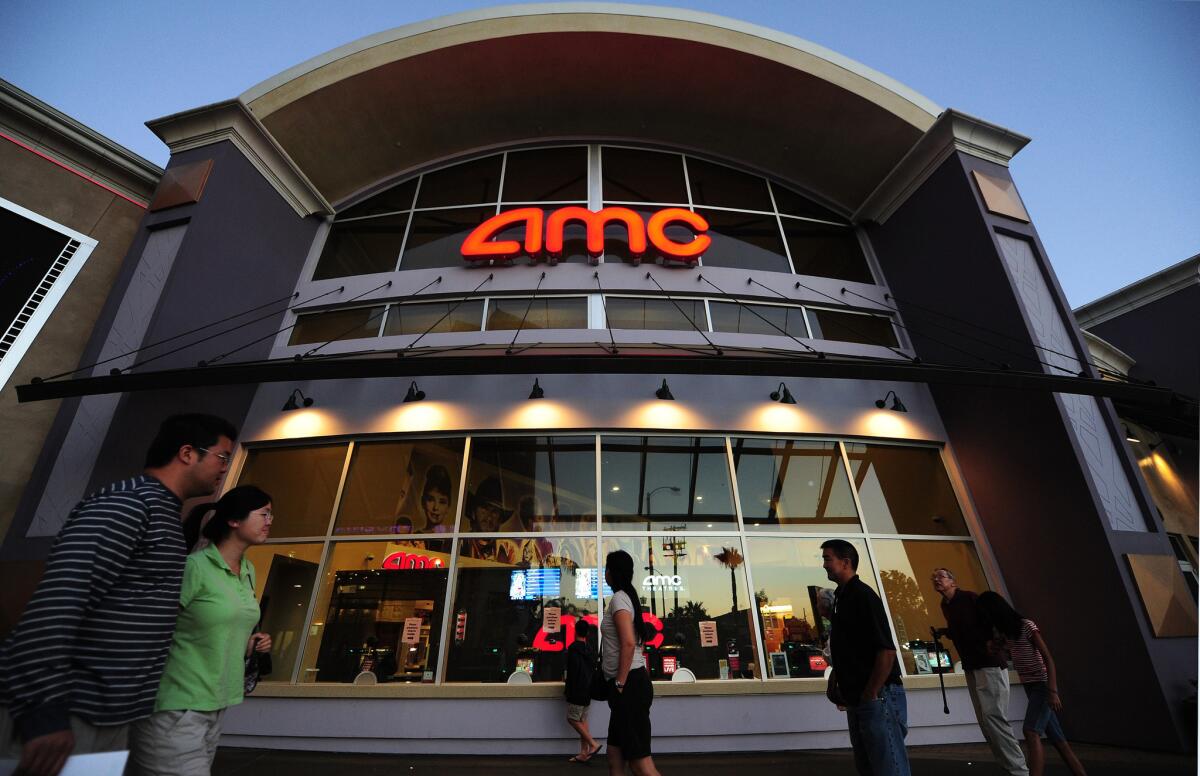Never mind, phone addicts: AMC won’t let you text in theaters after all

There’s a lot of interest these days in whether millennials will be as interested in going to movie theaters as baby boomers have been, says Adam Aron, CEO of cinema giant AMC Entertainment.
- Share via
It’s a conundrum for theater owners: how to lure younger, tech-savvy audiences who are staying away from the multiplex, without alienating their existing clientele.
One idea, floated innocently enough this week in Las Vegas by AMC Entertainment Chief Executive Adam Aron, was to designate special auditoriums where moviegoers could freely text away while watching movies.
Now the company is saying never mind to that proposal after a swift public outcry on social media.
“There will be no texting allowed in any of the auditoriums at AMC Theatres,” Aron said in a statement Friday. “Not today, not tomorrow and not in the foreseeable future.”
It was a quick reversal, coming just two days after Aron told the Los Angeles Times that the company may consider introducing texting-friendly theaters in order to better serve tech-obsessed young people. Speaking at the CinemaCon film business convention at Caesars Palace, Aron compared the prohibition on texting to telling young people to cut their left arms off.
Theater executives like Aron have ample reason to consider changing their policies.
Global ticket sales may have hit a record $38.3 billion last year, but theater owners are facing an increasingly difficult situation. Young people — long the cinema industry’s most desired customers — are opting to stay home.
Average attendance among 18-to-24-year-olds fell to its lowest level in at least five years in 2015, according to a new report from the Motion Pictures Assn. of America. Those moviegoers bought an average of 5.9 tickets each last year in the U.S. and Canada, down 5% from 2014 and a striking 24% from 2012. Young adults also accounted for a smaller number of frequent moviegoers than in past years.
Theater chains like AMC have tried to combat the long-term stagnation in movie theater attendance by investing huge sums of money in improving their auditoriums with more comfortable seating and introducing high-end food and beverage options in their lobbies.
They have also experimented with ideas to court specific segments of the population (think morning screenings for stay-at-home parents to take babies, or showings designed for people with special needs).
But it appears that texting-friendly theaters are still non-starters. Some people on social media sites complained that constantly seeing people’s bright phone screens in cinemas put them off going to theaters in the first place.
Alamo Drafthouse founder Tim League also weighed in this week, saying special auditoriums for texting could “seriously hurt” the cinema industry. League suggested that the industrywide texting ban is key to preserving the theater’s appeal. He also contended that allowing audiences to check their phones during a movie is disrespectful to filmmakers. The Texas-based chain operates in 23 locations and is known for its strict policy against texting in theaters.
“We as exhibitors rely completely on these creators for our content and have an unwritten obligation to present their films in the best possible way: on a big screen with big sound and a bright picture in a silent, dark room,” League said. “You can only be immersed in a story if you are focused on it.”
It’s not the first time that there has been a dust-up at CinemaCon over the issue. During a 2012 industry discussion panel, Regal Entertainment Chief Executive Amy Miles created uproar when she suggested theater executives considered allowing cellphones to be used during some youth-oriented films.
Paul Dergarabedian, a box-office analyst at ComScore, said he understands exhibitors’ need to adapt to changing consumer habits but agreed that allowing anything to distract from the film is a tough sell for traditional movie fans.
“It’s the old-fashioned movie going experience clashing with new technology, and it’s hard to reconcile those two things,” Dergarabedian said. “The very idea of doing anything other than watching the movie is an anathema to everything we’ve been taught about the proper way to behave in a movie theater.”
AMC, which is poised to become the world’s largest theater operator if its proposed acquisition of Carmike Cinemas is approved, said it abandoned the concept after hearing the response from consumers.
“In this age of social media, we get feedback from you almost instantaneously and as such, we are constantly listening,” Aron said. “Accordingly, just as instantaneously, this is an idea that we have relegated to the cutting room floor.”
“Instead,” he added, “we’ll focus on our other
ideas to delight and entertain you. In the next few years, we intend to invest more than $1 billion to continuously enhance our theaters and systems.”
ryan.faughnder@latimes.com
More to Read
Sign up for The Envelope
Get exclusive awards season news, in-depth interviews and columnist Glenn Whipp’s must-read analysis straight to your inbox.
You may occasionally receive promotional content from the Los Angeles Times.





